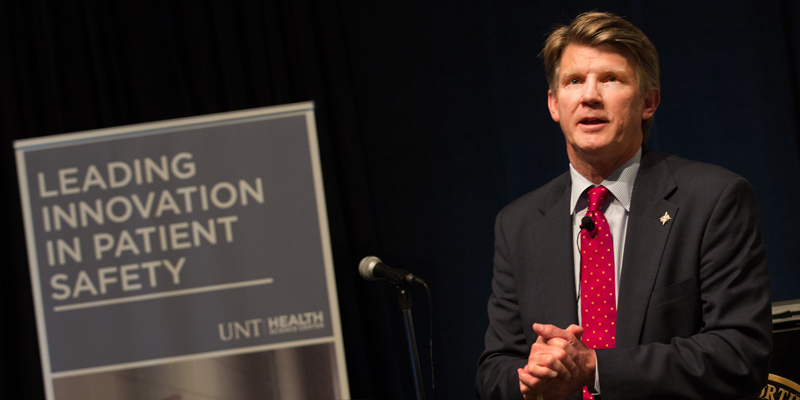Patient Safety Summit shares innovations inspired by tragedies
By Jan Jarvis

Lessons learned from tragedy – both in the skies and on the ground – will be addressed during UNT Health Science Center’s third annual Patient Safety Summit starting Thursday at the Fort Worth Club.
During the third annual summit on the “Ethical Imperative of Highly Reliable and Safe Patient Care,” participants will hear how the Space Shuttle Columbia disaster that killed its seven-member crew in 2003 became the springboard for improvements in safety at NASA.
They’ll also hear how a hospital in Fredricksburg, Texas, was transformed into a model of safety following the death of a teenage boy who was initially told to go home despite having stroke symptoms.
Both tragedies led to innovative approaches to safety for astronauts and patients alike. Programs that have worked to protect astronauts in space can also be applied to ensure the safety of patients in the hospital, said Thomas Diller, MD, Executive Director of the Institute for Patient Safety at UNTHSC.
“A catastrophic failure led NASA to look at what it could do to make sure it never happened again,” Dr. Diller said. “NASA’s No. 1 priority became astronauts’ safety.”
Although the industries are different, some of the same concepts used by NASA can be applied to healthcare to make patient safety a priority, Dr. Diller said.
During the summit, the parents of the teenager who died following a series of care mishaps at Hill Country Memorial in Fredericksburg will provide a personal perspective on safety as part of a panel discussion. Also appearing on the panel is UNT Health Science President Dr. Michael Williams, who was CEO of Hill Country Memorial at the time. Under his leadership, he turned the hospital into a model for quality and safety.
Presentations during the summit will center around three topics: leadership, culture and ethics.
“Leadership within the industry has to be fully committed to high reliability safety,” Dr. Diller said. “The culture has to change so that safety is the No. 1 value in an organization.”
Ethical behavior has to be a part of the day-to-day activities in a hospital and not just during critical life and death issues, he said.
Creating high-reliability teams, developing a safety culture and addressing the impact of unconscious bias on the quality of care also will be discussed during the summit.
The two-day summit is presented annually by the Institute for Patient Safety, which was established to make health care safer in North Texas and the nation. It opened in 2016 with the assistance of state Senator Jane Nelson, who helped secure funding from the Texas Legislature.
Nationwide, more than 250,000 American die annually from preventable medical errors. These mistakes lead to an estimated $50 billion in added U.S. health care costs and up to $1 trillion in lost human potential and contributions.
The Institute for Patient Safety is trying to turn around those grim statistics through collaborative, patient-centered, interprofessional initiatives.
“Patients expect healthcare to take care of them and not hurt them,” Dr. Diller said. “That’s what we want too.”




Social media